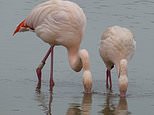
Flamingos form friendships that last for years and avoid certain individuals they ‘don’t get on with’, study findsResearchers studied flocks of flamingos in the WWT Slimbridge Wetland CentreThey found that the birds consistently spend their time with close ‘friends’The finds may help to better manage the lives of flamingos living in captivity
Flamingos form friendships that last for years and also avoid certain individuals they ‘don’t get on with’, a study has found.
Researchers from the University of Exeter studied flocks of four flamingo species at the Wildfowl & Wetlands Trust Slimbridge Wetland Centre between 2012–16.
They found that — although flamingos are highly social as part of large flocks — the wading birds consistently spend their time with specific close ‘friends’.
Social bonds seen in the flamingo flocks include so-called ‘married’ couples, same-sex friendships and even groups of three and four close friends.
Scroll down for video
Flamingos, pictured, form friendships that last for years and also avoid certain individuals that they ‘don’t get on with’ a study has found
‘Our results indicate that flamingo societies are complex. They are formed of long-standing friendships rather than loose, random connections,’ said paper author and zoologist Paul Rose of the University of Exeter.
‘Flamingos don’t simply find a mate and spend their time with that individual.
‘Some mating couples spend much of their time together, but lots of other social bonds also exist.
‘We see pairs of males or females choosing to “hang out”, we see trios and quartets that are regularly together.
‘Flamingos have long lives — some of the birds in this study have been at Slimbridge since the 1960s — and our study shows their friendships are stable over a period of years,’ Dr Rose added.
‘It seems that — like humans — flamingos form social bonds for a variety of reasons, and the fact they’re so long-lasting suggests they are important for survival in the wild.’
The findings could help in the management of captive flamingos, Dr Rose said.
‘When moving birds from one zoo to another, we should be careful not to separate flamingos that are closely bonded to each other,’ he explained.
Researchers from the University of Exeter studied flocks of four flamingo species at the Wildfowl & Wetlands Trust Slimbridge Wetland Centre between 2012–16
In their study, Dr Rose and fellow University of Exeter animal behaviour expert Darren Croft monitored flocks of Caribbean, Chilean, Andean and Lesser flamingos for five years from 2012 onward.
The number of birds in each flock varied from just over 20 to more than 140 — with the research duo finding that the larger flocks exhibited the highest levels of social interactions.
‘The simple lesson of this is that captive flamingo flocks should contain as many birds as reasonably possible,’ Dr Rose added.
The researchers found that — although flamingos are highly social as part of large flocks — the wading birds consistently spend their time with specific close ‘friends’
‘Our results indicate that flamingo societies are complex. They are formed of long-standing friendships rather than loose, random connections,’ said paper author and zoologist Paul Rose
The researchers also found that the birds were more likely to form social bonds during the spring and summer — their breeding season.
The study also compared the birds’ condition — measured by the health of their feet — in three of the flocks, to see if there was a link between flamingo health and their social activity.
However, no such link was found — with Dr Rose noting that this could mean socialising is so important to flamingos that they continue it even when feeling unwell.
The full findings of the study were published in the journal Behavioural Processes.
Advertisement
Share or comment on this article:
Source link
CHECK OUT: Top Travel Destinations
READ MORE: Travel News



